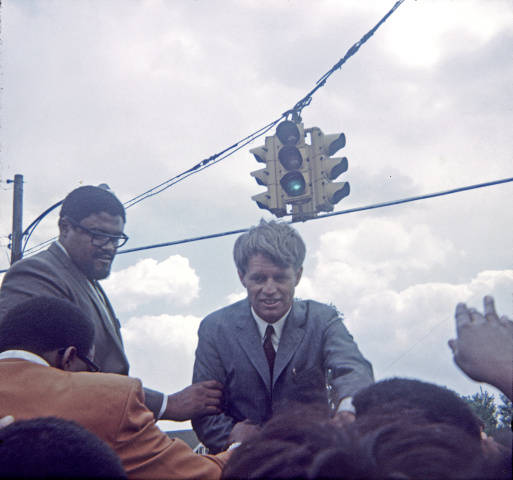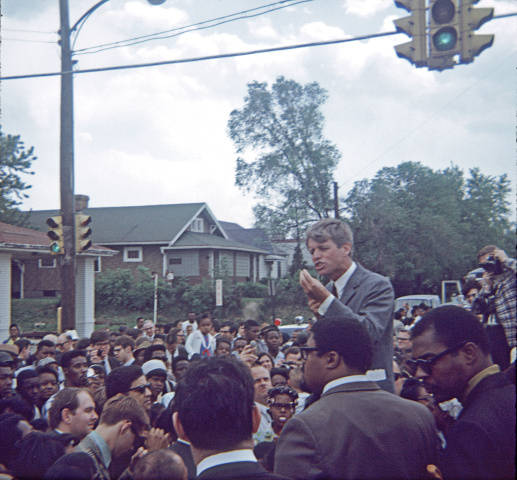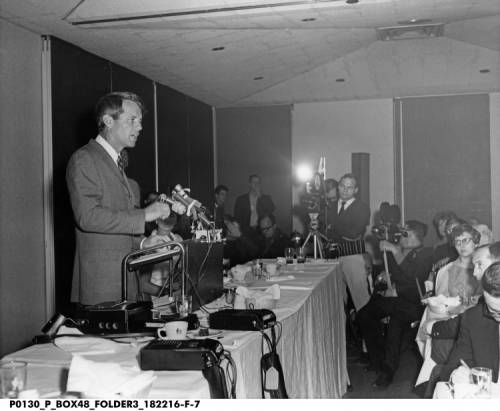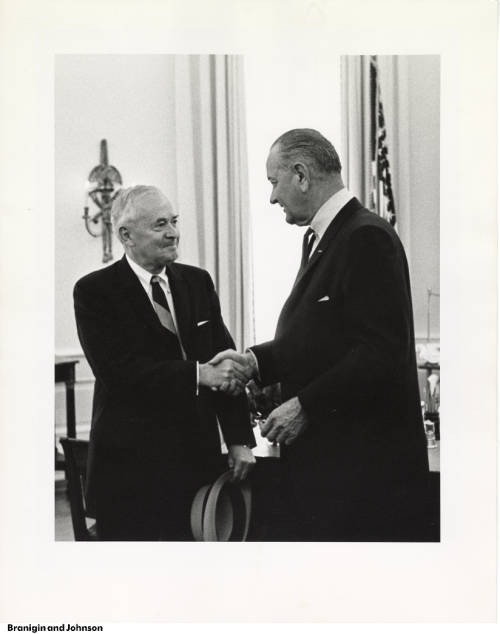
Purchase Tickets
1968: An Election to Remember
April 15, 2021

For most of April and early May in 1968, the eyes of the nation turned to the Hoosier State. Reporters and television correspondents from around the country flocked to Indiana to report on the state’s Democratic presidential primary. The primary campaign 53 years ago attracted such wide attention due to the entry into the race of Robert F. Kennedy, the junior U.S. senator from New York. In the primary, Kennedy faced off against two opponents — fellow senator Eugene McCarthy from Minnesota, and Indiana governor Roger D. Branigin, running as a favorite-son candidate.
In deciding to make the Indiana primary his first test before voters, Kennedy hoped the nineteenth state might provide the same validation to his presidential ambitions as West Virginia had done for his brother in his primary battle with Hubert Humphrey in 1960, removing the taint that no Roman Catholic could be elected president. “Indiana is the ballgame,” Kennedy told one of his aides. “This is my West Virginia.”

On May 4, 1968, A throng of people from the neighborhood at 21st and Harding streets in Indianapolis gather around Kennedy during a campaign stop shortly before Primary Election Day. Indiana Historical Society.
In his campaign literature and rallies before Hoosier voters, Kennedy emphasized that Indiana had the opportunity, with its decision in the Democratic primary, to once again, as it had in the past, play a vital role in the country’s presidential contest. “Indiana can help choose a president,” Kennedy repeated again and again in his speeches.
Kennedy hoped to gain enough of a mandate in Indiana to knock McCarthy out of the race for good. Because he could not pick up enough delegates from primary states to win the nomination, Kennedy also wanted to have enough strong showings to impress the heads of city and state Democratic organizations, such as Chicago mayor Richard Daley, who controlled the majority of delegates at the convention through caucuses and state conventions. Kennedy wanted to prove to party stalwarts that he could attract the support of not just African Americans and college students, but poorer, white voters worried about violence in their communities and fearful of the gains made by African Americans in civil rights and equal access.

As reporters crowd the room, Kennedy speaks on crime and violence in American society before a group of Marion County Democrats in Indianapolis. During the 1968 Indiana primary, Kennedy relied on a group of younger, more liberal Hoosier Democrats to help his campaign. He also leaned on the advice of former Indianapolis Times reporter and freelance writer John Bartlow Martin, who had grown up in Indianapolis. Bass Photo Co Collection, Indiana Historical Society.
In addition to showcasing such national political figures as Kennedy and McCarthy, the Indiana presidential primary shone a spotlight on some fascinating Hoosier politicians, especially Governor Branigin, a Harvard-educated lawyer from Franklin, Indiana. An engaging, witty speaker with an encyclopedic knowledge of the state’s history, Branigin had initially agreed to run as a stand-in for President Lyndon B. Johnson in the primary. Four years before, Indiana governor Matthew Welsh had played a similar role for Johnson, running, and winning, the Indiana primary against George Wallace, the segregationist governor of Alabama.
With Johnson’s announcement on March 31 that he would not seek or accept his party’s nomination for president, a stunned Branigin nevertheless decided to remain in the race as a favorite-son candidate. He hoped to win some influence for Indiana’s 63 delegates at the Democratic convention in Chicago, slated to be held in August 1968. Time and time again during the campaign he repeated that national issues were not at stake in Indiana. “What is at stake here,” he told his supporters, “is who is going to represent the state of Indiana in Chicago.”

Branigin maintained cordial relationships with many important political figures, including John and Jackie Kennedy and Lyndon B Johnson. His relationship with President Johnson proved to be most fruitful, as he was chosen to stand in for Johnson in the 1968 presidential primary election. Many described Branigin as likeable and down-to-earth. Honorable Roger D. Branigin Archives, Franklin College
McCarthy and his campaign never seemed to hit their stride in Indiana. One key McCarthy staff member called his time in the state a “frustrating, painful experience.” Workers had to endure poor press coverage, ineffective cooperation with local supporters, and a pending strike by telephone installers that hampered the campaign’s communication efforts. Those who canvassed the state seeking votes on McCarthy’s behalf were usually met with blank stares and the question: “McCarthy who?” The senator wasted much of his time attempting to draw crowds in smaller rural communities and hampered his own efforts by making last-minute decisions to alter or cancel his planned schedule.
Focusing on appearances in small communities, McCarthy encountered small crowds and appeared uncomfortable connecting with Hoosiers. Erratic scheduling that made him late for some appearances and miss out on large crowds waiting for him in others did not help matters. Later, McCarthy summed up his unease while campaigning by noting that he kept hearing from people about a poet, and asked if they were referring to William Shakespeare or perhaps his friend Robert Lowell. “But it was James Whitcomb Riley,” he said. “You could hardly expect to win under those circumstances.”
Kennedy, too, had a difficult time during the early days of his campaign getting his message through to Indiana voters. The senator, however, threw himself into the campaign, barnstorming around the state in motorcades, making quiet stops at sites important to Indiana history in the southern portion of the state, and even resurrecting railroad whistle-stop campaigning on the Wabash Cannonball. “He always does better in person,” campaign aide Fred Dutton said of the candidate. “Because Bob is so misunderstood, he has to show himself.”
The night before Indiana voters went to the polls, Kennedy, exhausted from a full day of campaigning that started in Evansville and ended with a nine-hour motorcade through a series of communities in northwest Indiana, stopped for an early-morning dinner at an Indianapolis restaurant with campaign aides and members of the media. Kennedy, his hands red and swollen after shaking thousands of hands, reflected on his experiences and a decision that might end his fledgling effort at the White House once and for all. In a mellow mood, according to Village Voice reporter Jack Newfield, the candidate expressed a fondness for the state and its people. “I like Indiana. The people here were fair to me,” Kennedy said. “I gave it everything I had here, and if I lose, then, well, I’m just out of tune with the rest of the country.”
Kennedy would go on to win the May 7 Indiana primary. Kennedy captured 328,118 votes (42.3 percent) to 238,700 (30.7 percent) for Branigin and 209,695 (27 percent) for McCarthy. Winning the Indiana primary kept alive Kennedy presidential hopes. “He went yammering around Indiana,” John Bartlow Martin, Indiana historian and writer, noted of Kennedy, “about the poor whites of Appalachia and the starving Indians who committed suicide on the reservations and the jobless Negroes in the distant great cities, and half the Hoosiers didn’t have any idea what he was talking about; but he plodded ahead stubbornly, making them listen, maybe even making some of them care, by the sheer power of his own caring.”
A month later in Los Angeles, Kennedy was assassinated moments after his victory in the California Democratic presidential primary.









